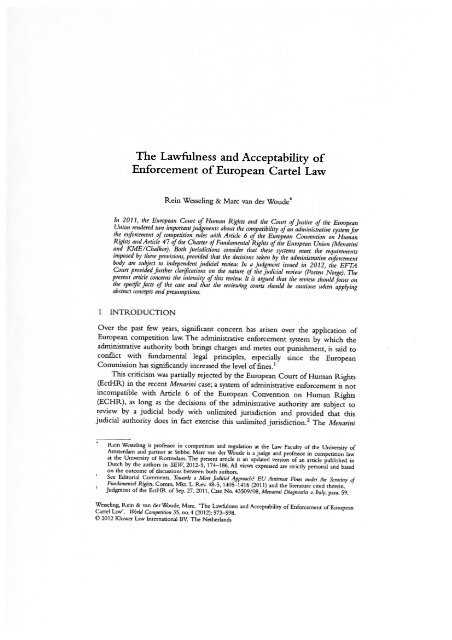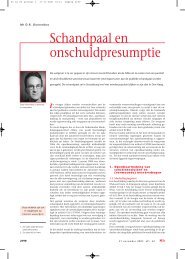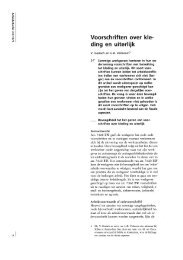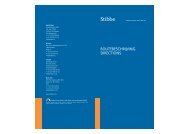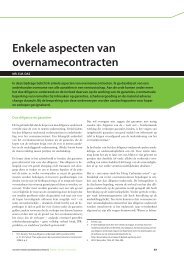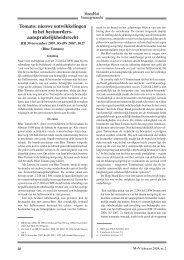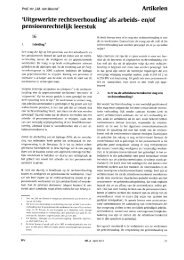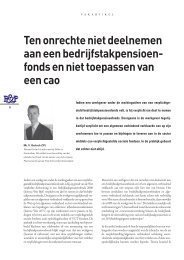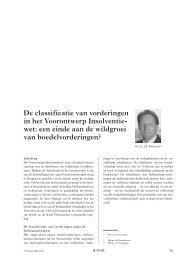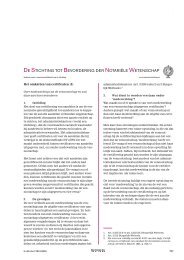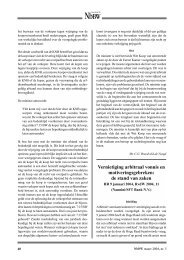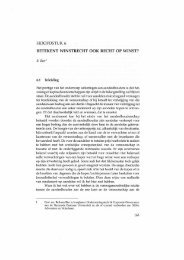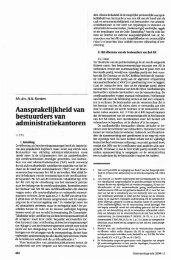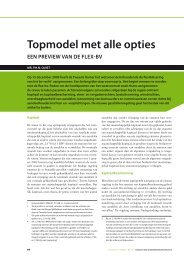The Lawfulness and Acceptability of Enforcement of ... - Stibbe
The Lawfulness and Acceptability of Enforcement of ... - Stibbe
The Lawfulness and Acceptability of Enforcement of ... - Stibbe
You also want an ePaper? Increase the reach of your titles
YUMPU automatically turns print PDFs into web optimized ePapers that Google loves.
*<br />
Cartel Law’. World Competition 35, no. 4 (2012): 573—598.<br />
© 2012 Kluwer Law International DV. <strong>The</strong> Netherl<strong>and</strong>s<br />
Wesseling, Rein & van der Woude, Marc. ‘<strong>The</strong> <strong>Lawfulness</strong> <strong>and</strong> <strong>Acceptability</strong> <strong>of</strong> <strong>Enforcement</strong> <strong>of</strong> European<br />
2<br />
Judgment <strong>of</strong> the EctHR <strong>of</strong> Sep. 27, 2011, Case No. 43509/08, Menarini Diagnostics v. Italy, para. 59.<br />
at the University <strong>of</strong> Rotterdam. <strong>The</strong> present article is an updated version <strong>of</strong> an article published in<br />
Fundamental Rights, Comm. Mkt. L. Rev. 48—5, 1405—1416 (2011) <strong>and</strong> the literature cited therein.<br />
See Editorial Comments, Towards a More Judicial Approach? EU Antitrust Fines under the Scrutiny <strong>of</strong><br />
Amsterdam <strong>and</strong> partner at <strong>Stibbe</strong>. Marc van der Woude is a judge <strong>and</strong> pr<strong>of</strong>essor in competition law<br />
on the outcome <strong>of</strong> discussions between both authors.<br />
Rein Wesseling is pr<strong>of</strong>essor in competition <strong>and</strong> regulation at the Law Faculty <strong>of</strong> the University <strong>of</strong><br />
l)utch by the authors in SEW, 2012-5. 174—186. All views expressed are strictly personal <strong>and</strong> based<br />
Over the past few years, significant concern has arisen over the application <strong>of</strong><br />
European competition law. <strong>The</strong> administrative enforcement system by which the<br />
Commission has significantly increased the level <strong>of</strong> fines.<br />
(EctHR) in the recent Menarini case; a system <strong>of</strong> administrative enforcement is not<br />
judicial authority does in fact exercise this unlimited jurisdiction.<br />
2 <strong>The</strong>itm<br />
vlenarini<br />
administrative authority both brings charges <strong>and</strong> metes out punishment, is said to<br />
conflict with fundamental legal principles, especially since the European<br />
review by a judicial body with unlimited jurisdiction <strong>and</strong> provided that this<br />
(ECHR), as long as the decisions <strong>of</strong> the administrative authority are subject to<br />
incompatible with Article 6 <strong>of</strong> the European Convention on Human Rights<br />
This criticism was partially rejected by the European Court <strong>of</strong> Human Rights<br />
1<br />
1 INTRODUCTION<br />
Court provided forther clarflcations on the nature <strong>of</strong> the judicial review (Posten NorgeJ. <strong>The</strong><br />
body are subject to independent judicial review. In a judgment issued in 2012, the EFTA<br />
the specfic facts <strong>of</strong> the case <strong>and</strong> that the reviewing courts should be cautious when applying<br />
imposed by these provisions, provided that the decisions taken by the administrative emforcement<br />
<strong>and</strong> KME/Chalkor. Both jurisdictions consider that these systems meet the requirements<br />
the emforcement <strong>of</strong> competition rules with Article 6 <strong>of</strong> the European Comwention on Human<br />
abstract concepts <strong>and</strong> presumptions.<br />
Union rendered two important judgments about the compatibility <strong>of</strong> an administrative system for<br />
Rights <strong>and</strong>Article 47 <strong>of</strong> the Charter <strong>of</strong> Fundamental Rights <strong>of</strong> the European Union (Menarini<br />
present article concerns the intensity <strong>of</strong><br />
this review. It is argued that the review should focus on<br />
In 2011, the European Court <strong>of</strong> Human Rights <strong>and</strong> the Court qfJustice <strong>of</strong> the European<br />
Rein Wesseling & Marc van der Woude*<br />
<strong>Enforcement</strong> <strong>of</strong> European Cartel Law<br />
<strong>The</strong> <strong>Lawfulness</strong> <strong>and</strong> <strong>Acceptability</strong> <strong>of</strong>
- Authority,<br />
4<br />
<strong>and</strong><br />
in the<br />
even<br />
574 WORLD COMPETITION<br />
judge can substitute his opinion on punishment for that <strong>of</strong> the administrative<br />
rights as long as the decisions <strong>of</strong> the administrative authority <strong>and</strong> the facts<br />
view that administrative enforcement systems are compatible with fundamental<br />
ECHR <strong>and</strong> Article 47 <strong>of</strong> the Charter <strong>of</strong> Fundamental Rights <strong>of</strong> the European<br />
Union (the Charter).<br />
performed by the General Court complies with the requirements <strong>of</strong> Article 6<br />
Justice) recently held in the KME <strong>and</strong> Clialkor cases that the judicial review<br />
case concerned the administrative system enforcing Italian competition law. As far<br />
underlying the decision are subject to in-depth judicial review <strong>and</strong> the reviewing<br />
as the European system is concerned, the Court <strong>of</strong>Justice <strong>of</strong> the EU (the Court <strong>of</strong><br />
subsequently applied the principles <strong>and</strong> ruled explicitly that administrative<br />
authority In a well—reasoned judgment (Posten Norge) the EFTA Court<br />
authorities cannot be regarded as having any margin <strong>of</strong> discretion —<br />
assessment <strong>of</strong> ‘complex economic matters’ —<br />
examine whether it is itself convinced that the conclusions drawn by the<br />
administrative authority are supported by the facts.<br />
to the discontent <strong>and</strong> criticism <strong>of</strong> the system in which European competition law<br />
is applied? We do not think so.a<br />
system has the ‘external characteristics’ <strong>of</strong> a system that complies with the<br />
acceptable legal principles or by citing abstract formulas on the nature <strong>of</strong> judicial<br />
procedures should not be characterized by formalistic applications <strong>of</strong> theoretically<br />
necessary guarantees but rather how the system operates in practice. Judicial<br />
review No, the enforcement system is only compatible with the requirements <strong>of</strong><br />
due process as long as the authorities properly consider the specific facts <strong>and</strong><br />
application <strong>of</strong> generally formulated legal qualifications, the parties involved should<br />
circumstances <strong>of</strong> the case. Where authorities revert to formalism <strong>and</strong> blanket<br />
authorities examined all facts <strong>and</strong> circumstances which are relevant to their specific<br />
have effective means to persuade the review courts to assess in detail whether the<br />
<strong>and</strong> individual case.<br />
see paras. 1 (JO <strong>and</strong> 101.<br />
See, for instance, recent publications <strong>of</strong> J.F. Bellis, ‘L’accusé a toujours Ic dernier mot’, Editorial<br />
971—1006 (2012).<br />
Judgments <strong>of</strong> the Court <strong>of</strong> Justice <strong>of</strong> Dec. 8, 2011, Cases C—386/l0 P, Ciialkor is Coniniissiori,<br />
Judgment <strong>of</strong> the EFTA Court <strong>of</strong> Apr. 18, 2012, Case E—15/l0, Posten Nore AS is EFTA Surveillance<br />
published in ECR.<br />
C—272/09 P. KME a,,d Others is C’o,nmission, <strong>and</strong> C—389/1 0 P. KME <strong>and</strong> Others is Commission, not yet<br />
2011); <strong>and</strong> R. Nazzini, Adniinistrative <strong>Enforcement</strong>, Judicial Review <strong>and</strong> Fundamental Ri’hts in EU<br />
Comment for C’oncurrences, no I (2012);J. Temple Lang, Three Possibilities for Reform <strong>of</strong> the Procedure <strong>of</strong><br />
the European Commission in Competition Cases under Regulation 1/2003, CEPS Spec. Rept. (Nov.<br />
Competition Law: A Comparative Contextual-Functional Perspective, 49(3) Comm. Mkt. L. Rev..<br />
According to our interpretation <strong>of</strong> the rulings, the crux is not whether the<br />
Will the rulings in Menarini, KME <strong>and</strong> Clialkor (<strong>and</strong> Posten Norge) put an end<br />
3 <strong>The</strong> EctHR <strong>and</strong> the Court <strong>of</strong> Justice therefore hold the<br />
that the reviewing court must
not <strong>of</strong>fer the guarantee that this customized approach will always be provided. For<br />
As we shall discuss below, we fear that the current enforcement system does<br />
market—sharing cartel.<br />
(AGCM), which is organized along the lines <strong>of</strong> an administrative authority, had<br />
imposed on a dealer in diabetes tests for its participation in a price <strong>and</strong><br />
concerned a EUR 6 million fine which the Italian competition authority<br />
<strong>of</strong> the Italian antitrust enforcement system with Article 6 ECHR. <strong>The</strong> case<br />
As mentioned in the introduction, the EctHR recently ruled on the compatibility<br />
2.1 THE MENARINI CASE<br />
COMPETITION LAW UNDER ADMINISTRATIVE LAW<br />
2 RECENT JUDGMENTS ON THE ENFORCEMENT OF<br />
people operate. It should, on the contrary, lead to results that the outside world<br />
(although not necessarily the fined parties themselves) accepts as fact specific <strong>and</strong><br />
fostering European integration, will only be able to count on public acceptance<br />
support is very much needed given that political support for further European<br />
integration appears uncertain. Great projects, such as ensuring the rule <strong>of</strong> law <strong>and</strong><br />
can be transformed into continued support for the internal market project. That<br />
We submit that a reassessment is in the interest <strong>of</strong> both undertakings <strong>and</strong><br />
well-defined circumstances in which these concepts were developed (4).<br />
cases mentioned above (2). This will be followed by an examination <strong>of</strong> the legal<br />
fair. By making enforcement systems evolve, resentments felt by the European<br />
abstract affair disconnected from the real world in which companies <strong>and</strong> business<br />
reassessment process. First, we shall discuss the content <strong>of</strong> the judgments in the<br />
It is against that backdrop that we will try to sketch the contours <strong>of</strong> this<br />
debate on the reassessment <strong>of</strong> the current enforcement system.<br />
the judgments Menarini, KME <strong>and</strong> Chalkor mark the start rather than the end <strong>of</strong> a<br />
<strong>and</strong> fines (3). We shall then make a few suggestions on how to avoid their<br />
formalistic application, in particular in situations that do not correspond to the<br />
enforcers. Enforcing competition rules should not be (or be perceived to be) an<br />
<strong>and</strong> support if their individual components are visibly in balance.<br />
a tendency to apply abstract legal principles in a formalistic way <strong>and</strong> that such<br />
same applies to the methodology used for fining purposes. We believe that there is<br />
business community towards current enforcement procedures in competition cases<br />
TFEU to cartel infringements have developed in a rather abstract manner. <strong>The</strong><br />
the past few decades, the legal definitions underlying the application <strong>of</strong>Article 101<br />
application can conflict with the requirements <strong>of</strong> Article 6 ECHR. In that sense,<br />
concepts that the Courts have developed in cases relating to cartel infringements<br />
ENFORCEMENT OF EUROPEAN CARTEL LAW 575
Administrative Court <strong>of</strong> Latium. One <strong>of</strong> the grounds for appeal concerned the<br />
<strong>The</strong> dealer in question, Menarini, challenged the ruling before the<br />
576 WOPLD COMPETITION<br />
Whilst it is true that the jurisdiction <strong>of</strong> the Administrative Court is limited to a<br />
review <strong>of</strong> legality; it is nevertheless competent to assess the evidence adduced by<br />
the AGCM <strong>and</strong> to consider whether the AGCM remained within the limits <strong>of</strong> its<br />
substitute its opinion for that <strong>of</strong> the AGCM. Menarini challenged that ruling<br />
before the Italian Council <strong>of</strong> State. <strong>The</strong> latter ruled differently to the lower court.<br />
review <strong>of</strong> legality (un contróle de 1éa1ite’) <strong>and</strong> that it does not have the power to<br />
rejected the appeal, although the ruling indicates that its jurisdiction is limited to a<br />
have unlimited jurisdiction (un contróle de pleine juridiction). <strong>The</strong> Latium court<br />
unconstitutionality <strong>of</strong> the fine because the administrative court seemingly did not<br />
discretionary power. <strong>The</strong> Council <strong>of</strong> State moreover held that the Administrative<br />
Court has unlimited jurisdiction in the sense that it can decide on the<br />
necessary, replace the sanction. After a detour via the Italian Court <strong>of</strong> Cassation,<br />
appropriateness <strong>of</strong> the sanction in light <strong>of</strong> the committed infringement <strong>and</strong>, if<br />
Menarini instituted proceedings in Strasbourg.<br />
preventative <strong>and</strong> repressive in nature <strong>and</strong> is punitive in character due to the size <strong>of</strong><br />
the sanction. This accordingly corresponds to a criminal sanction falling within the<br />
does not prohibit a system in which an administrative authority imposes such<br />
scope <strong>of</strong> Article 6 ECHR. However, the EctHR held the view that this provision<br />
fines, so long as the party involved is able to contest the sanction before a judicial<br />
jurisdiction. This jurisdiction assumes that this judicial body has the power to<br />
body that <strong>of</strong>fers all the guarantees required by Article 6 ECHR. As such, the<br />
competition law is lawful or not depends on the nature <strong>and</strong> depth <strong>of</strong> the judicial<br />
answer to the question whether an administrative enforcement system for<br />
review <strong>of</strong> the administrative authority.<br />
ECHR if the fining decision is subject to review by a judicial body with unlimited<br />
administrative fines <strong>of</strong> a criminal law nature can only be consistent with Article 6<br />
considered that the review options <strong>of</strong> the Italian Administrative Court in this<br />
legal questions.<br />
review all aspects <strong>of</strong> the decision <strong>and</strong> that it can consider all relevant factual <strong>and</strong><br />
AGCM has a discretionary power, the Italian courts could check whether this<br />
legal arguments <strong>and</strong> examine the evidence adduced by the AGCM. Even if the<br />
satisfied in this case. <strong>The</strong> Italian courts could rule on all <strong>of</strong> Menarini’s factual <strong>and</strong><br />
administrative authority used this power appropriately. In particular, they could<br />
even if these choices related to technical assessments. <strong>The</strong> EctHR therefore<br />
consider whether the AGCM’s policy choices were well-founded <strong>and</strong> balanced,<br />
<strong>The</strong> EctHR found that the imposed sanction is based on rules that are both<br />
As far as that judicial review is concerned, the EctHR explained that<br />
According to the majority opinion <strong>of</strong> the EctHR, these conditions were
the appropriateness <strong>and</strong> proportionality <strong>of</strong> the fine <strong>and</strong> replace it, if necessary, it<br />
system go beyond a mere legality review Moreover, since this court could rule on<br />
Posten Norc,’e, cited n. 4 above. paras. 89 <strong>and</strong> 90.<br />
St-Peterslnny v. Russia.<br />
e Frcwe, judgment <strong>of</strong> July 15, 2003, Forruin e. Finl<strong>and</strong> <strong>and</strong> judgment <strong>of</strong> June 3, 2004, Neste<br />
See earlier EctHR cases concerning competition systems: judgment <strong>of</strong> Feb. 27, 1992. Saciété Stenuit<br />
‘<br />
intrusively test the underlying facts <strong>of</strong> the contested ruling, even if this involves<br />
Article 6 ECHR, does not mean that all administrative enforcement systems<br />
the recent Posten Norge case that these cannot be considered as criminal charges <strong>of</strong><br />
Article 6 ECHR must be guaranteed in substance.<br />
appropriateness <strong>of</strong> the sanction for the sanction imposed by the administrative<br />
authority.<br />
finding that the Italian system, as applied in the Pvlenarini case, complied with<br />
does require that it has unlimited jurisdiction. <strong>The</strong> appeal court must be able to<br />
realize that those judgments are tailored to the facts <strong>of</strong> a particular case. <strong>The</strong><br />
with general effect can be inferred from judgments <strong>of</strong> the EctHR, one must always<br />
violation <strong>of</strong> the competition rules, the guarantees provided in the criminal head <strong>of</strong><br />
compatible if it satisfies two conditions.<br />
technical assessments <strong>and</strong> it must be able to substitute its opinion on the<br />
not give an unconditional answer to the question <strong>of</strong> compatibility. As we have<br />
<strong>The</strong> first condition comes explicitly from the Menarini judgment <strong>and</strong> relates<br />
independent review <strong>of</strong> all relevant facts <strong>and</strong> circumstances on its own motion, it<br />
an administrative enforcement system with Article 6 ECHR. Contrary to the<br />
Another issue that is resolved in the Menarini case concerns compatibility <strong>of</strong><br />
7<br />
<strong>of</strong> this area <strong>of</strong> law <strong>and</strong> its sanctions, the EctHR naturally answers this question in<br />
was not already previously concluded.<br />
6 Having regard to the far-reaching nature<br />
not (European) competition law has a criminal law nature —<br />
minor weight. In view <strong>of</strong> the amount <strong>of</strong> the fine <strong>and</strong> the stigma attached to a<br />
ins<strong>of</strong>ar<br />
as that debate<br />
the affirmative. With what degree <strong>of</strong> stringency all rights <strong>and</strong> guarantees flowing<br />
severity <strong>of</strong> charges in competition law procedures, the EFTA Court concluded in<br />
answer to the question on the applicability <strong>of</strong> Article 6 ECHR, the EctHR does<br />
the EctHR does not require the appeal court to conduct a complete <strong>and</strong><br />
In our opinion, the second condition comes implicitly from the Menarini case<br />
In our opinion, the Menarini case puts an end to the debate as to whether or<br />
already stated in the introduction, an administrative enforcement system is only<br />
to the judicial review to which the administrative authority is subject. Although<br />
had unlimited jurisdiction.<br />
from the ECHR will apply in individual cases must then be determined with<br />
regard to the weight <strong>of</strong> the criminal charge at issue. Concerning the nature <strong>and</strong><br />
<strong>and</strong> relates to how the EctHR h<strong>and</strong>s down judgments. Even though principles<br />
ENFORCEMENT OF EUROPEAN CARTEL LAW 577
8<br />
57$ WORLD COMPETITION<br />
other rules, such as the principle <strong>of</strong> proportionality, the obligation to provide<br />
out that this approval only relates to Article 6 ECHR <strong>and</strong> does not extend to<br />
system <strong>of</strong> administrative enforcement <strong>of</strong> competition rules. We also wish to point<br />
which an administrative authority must observe.<br />
a system theoretically complies with these requirements, it cannot be automatically<br />
within which competition rules are being enforced do so as well. And even if such<br />
concluded that this also applies to the application there<strong>of</strong> in a specific case.<br />
reasons <strong>and</strong> other specific rights <strong>of</strong> the defence (e.g., the right to remain silent),<br />
fining guidelines). According to the General Court, the limitation <strong>of</strong> the<br />
Commission’s discretionary powers arising from these guidelines does not exclude<br />
the Commission from departing from the guidelines, provided that this deviation is<br />
Three months after the ruling in Menarini, the Court <strong>of</strong> Justice ruled on the<br />
2.2 THE KME ANI) CHALKOR CASES<br />
compatibility <strong>of</strong> the European administrative enforcement system with Article 47<br />
justified <strong>and</strong> duly motivated. <strong>The</strong> General Court does however point out that this<br />
case, the question <strong>of</strong> law focused on the depth <strong>of</strong> the judicial review in this case<br />
<strong>of</strong> the Charter (the EU law equivalent <strong>of</strong>Article 6 ECHR).Just as in the Menarini<br />
contested ruling. According to the Court <strong>of</strong>Justice, this description was abstract in<br />
nature <strong>and</strong> not designed to respond to an argument that the parties had put<br />
the review by the General Court.<br />
Justice arguing that the manner in which the General Court had exercised its<br />
jurisdiction was incompatible with Article 6 ECHR.<br />
legality <strong>of</strong> the fine in light <strong>of</strong> the guidelines on the method <strong>of</strong> setting fines (the<br />
9 from how the General Court had described its jurisdiction in the<br />
judgments<br />
discretion does not affect it exercising its unlimited jurisdiction.<br />
law <strong>of</strong> the General Court is consistent. Its judgment only relates to how the<br />
forward. <strong>The</strong> Court <strong>of</strong>Justice also noted that it would not judge whether the case<br />
General Court exercised its jurisdiction in the cases at h<strong>and</strong>. After having pointed<br />
have looked at how it was applied in practice. In his opinion, this practical application would not<br />
have entailed an in-depth assessment.<br />
<strong>and</strong> C—389/lO P. KME <strong>and</strong> Others v. Commission, cited n. 3 above.<br />
Judgments in Cases C—386/lO 1 Chat/ear ii. Commission, C—272/09 P, KME <strong>and</strong> Others v. Commission,<br />
According to the dissenting opinion <strong>of</strong> Judge Pinto de Albuquerque in the Menarini case, the<br />
EctHR should not only have analysed the Italian enforcement system in the abstract, but should also<br />
<strong>The</strong> General Court had indicated in its judgments that it had to assess the<br />
<strong>The</strong> undertakings concerned appealed against this ruling to the Court <strong>of</strong><br />
By way <strong>of</strong> introduction, the Court <strong>of</strong> Justice distanced itself in the three<br />
Accordingly, we interpret the Menarini judgment as conditional approval <strong>of</strong> a
out the importance <strong>of</strong> Article 47 <strong>of</strong> the Charter as the EU law’s mirror provision<br />
ECR 1-987, para. 39.<br />
Judgment <strong>of</strong> the Court <strong>of</strong> Justice <strong>of</strong> Feb. 15, 2005. Case C—12/03 P, Commission t Tetra Laval [2005]<br />
account in order to assess a complex situation <strong>and</strong> whether it is capable <strong>of</strong><br />
or increase the imposed fine. However, the General Court can only exercise this<br />
incompatible with the principle <strong>of</strong> effective judicial protection. As such, the<br />
Charter.<br />
is subject to judicial review. In particular, the EU judicature should not only<br />
the judicial review in cases in which the Commission has discretionary powers.<br />
This discretion does not change the fact that the interpretation <strong>of</strong> economic data<br />
review the factual accuracy, reliability <strong>and</strong> consistency <strong>of</strong> the evidence but also<br />
the seriousness <strong>of</strong> the infringement. In this regard, the guidelines are only binding<br />
the General Court from conducting an in-depth review <strong>of</strong> the law <strong>and</strong> <strong>of</strong> the<br />
the Court <strong>of</strong>Justice concluded that the combination <strong>of</strong> the legality review <strong>and</strong> the<br />
carry out a thorough investigation into all factors that are important for assessing<br />
Justice described the jurisdiction <strong>of</strong> the former as the power to substitute its<br />
In reference to the unlimited jurisdiction <strong>of</strong> the General Court, the Court <strong>of</strong><br />
facts.<br />
rely on the Commission’s margin <strong>of</strong> discretion, neither as regards the choice <strong>of</strong> the<br />
assessment <strong>of</strong> these factors.<strong>The</strong> Commission’s discretionary power cannot dispense<br />
<strong>and</strong> how it weighed them up. In carrying out this threefold review <strong>of</strong> legality; the<br />
factors taken into account for the application <strong>of</strong> the fining guidelines nor for the<br />
referred to the formula that it used in the Tetra Laval case to describe the scope <strong>of</strong><br />
substantiating the conclusions drawn from it)°<br />
on the Commission. <strong>The</strong> General Court must thirdly consider, on its motion,<br />
General Court must base itself on the evidence adduced by the applicant. It cannot<br />
supervision in relation to the arguments that the applicant puts forward <strong>and</strong> on the<br />
General Court is not obliged to review the entire case file again. After this analysis,<br />
is thus no ex <strong>of</strong>ficio supervision is, according to the Court <strong>of</strong> Justice, not<br />
basis <strong>of</strong> the evidence that is submitted in substantiation there<strong>of</strong>. <strong>The</strong> fact that there<br />
Court.<br />
<strong>The</strong> Court <strong>of</strong>Justice raised three points regarding the review <strong>of</strong> legality It first<br />
whether that evidence contains all the information which must be taken into<br />
<strong>The</strong> Court <strong>of</strong> Justice secondly emphasized the need for the Commission to<br />
opinion <strong>of</strong> the sanction for that <strong>of</strong> the Commission’s <strong>and</strong> thus to withdraw; reduce<br />
unlimited jurisdiction with regard to the fines complies with Article 47 <strong>of</strong> the<br />
whether the Commission properly reasoned the factors that it took into account<br />
<strong>of</strong> Article 6 ECHR, the Court <strong>of</strong> Justice investigated the powers <strong>of</strong> the General<br />
ENFORCEMENT OF EUROPEAN CARTEL LAW 579
SYSTEM<br />
determining the duration <strong>of</strong> the infringement.<br />
It then considered whether this review was correctly exercised in these cases.<br />
580 WORLD COMPETITION<br />
evidence to substantiate its argument concerning the disproportionate nature <strong>of</strong><br />
the fine. In this way, the Court <strong>of</strong>Justice placed the ball back into the applicant’s<br />
instance, the Court <strong>of</strong>Justice noted that Chalkor had not put forward any specific<br />
court. <strong>The</strong> Court <strong>of</strong> Justice secondly stated, without going into detail, that the<br />
had also examined the appropriateness <strong>of</strong> the sanction itself.<br />
factors mentioned in the Guidelines <strong>and</strong> a number <strong>of</strong> factual aspects in relation to<br />
with reference to the Guidelines, the case law <strong>of</strong> the Court <strong>of</strong>Justice regarding the<br />
This analysis essentially boils down to a validation <strong>of</strong> the General Court’s ruling,<br />
General Court had not only assessed the sanction under the Guidelines but that it<br />
2.3 PRELIMINARY CONCLUSIONS ON THE UNLAWFULNESS OF THE EUROPEAN<br />
describing the scope <strong>of</strong> the judicial review in cases that are factually complex <strong>and</strong><br />
that generally imply a margin <strong>of</strong> assessment for the Commission. <strong>The</strong> Court <strong>of</strong><br />
lawfulness <strong>of</strong> administrative enforcement by the Commission. Even so, it seems to<br />
the existing system <strong>of</strong> judicial review by the General Court <strong>and</strong>, in doing so, the<br />
On the face <strong>of</strong> it, the judgments in KME <strong>and</strong> Clialkor confirm the lawfulness <strong>of</strong><br />
Justice no longer stated in the KME <strong>and</strong> Chalkor cases that the General Court<br />
us that these judgments will bring about some change in how the General Court<br />
has operated in cartel cases until now.<br />
Court described its jurisdiction in cartel cases. This is a signal that things must<br />
have to entail. One suggestion concerns the use <strong>of</strong> the st<strong>and</strong>ard formula for<br />
change, without the Court <strong>of</strong>Justice clearly indicating what those changes would<br />
appeal, the Court <strong>of</strong> Justice reversed a prohibition decision in a factually<br />
formula that it used in the Tetra Laval case, in which the General Court <strong>and</strong>, on<br />
nuist limit its review to manifest errors <strong>of</strong> assessment.<br />
complicated merger case. In other words, by choosing this formula, the Court <strong>of</strong><br />
In our opinion, two <strong>of</strong> these elements merit further attention. In the first<br />
Conm,nission. [2007] ECR 11—3601. para. 87).<br />
<strong>The</strong> st<strong>and</strong>ard formula normally reads as follows: <strong>The</strong> Court observes that it follows from consistent<br />
as to whether or not the conditions for the application <strong>of</strong> the competition rules are met, their<br />
case law that, although the Community Courts undertake a comprehensive review <strong>of</strong> the question<br />
review <strong>of</strong> complex econoiriic appraisals made by the Commission is necessarily limited to checking<br />
whether the relevant rules on procedure <strong>and</strong> on stating reasons have been complied with, whether<br />
misuse <strong>of</strong> powers.’ (judgment <strong>of</strong> the General Court <strong>of</strong> Sep. 17, 2007, Case T-201/04, Micros<strong>of</strong>t m.t<br />
the f.wts have been accurately stated <strong>and</strong> whether there has been any manifest error <strong>of</strong> acceptance or<br />
<strong>The</strong> Court <strong>of</strong> Justice firstly expressly distanced itself from how the General<br />
11 It referred directly to the
2<br />
from judicial review.<br />
Justice indicates that the complexity <strong>of</strong> the facts does not shield the Commission<br />
‘<br />
See the literature in footnote 10 <strong>of</strong> the Editorial Comments in Comm. Mkt. L. Rev. 48—5.<br />
Irel<strong>and</strong> <strong>and</strong> Others [2009] ECR 1—11245, paras. 53 <strong>and</strong> 54.<br />
1405—1416 (2011), cited n. I above.<br />
Re-empowering the Gourts?, 36—4 Eur. L. Rev. 457—479 (2011).<br />
See n. ii above for the formula <strong>and</strong> D. Gerard, Breaking the EU Antitrust <strong>Enforcement</strong> Deadlock:<br />
See, for example. judgment <strong>of</strong> the Court <strong>of</strong> Justice <strong>of</strong> Dec. 2, 2009, Case C—89/08 P. Commission v.<br />
General Court ought to assess this motivation on its own motion. This means that<br />
the Chalkor <strong>and</strong> KME cases. As we have already discussed above, the Court <strong>of</strong><br />
<strong>of</strong> audi alteram partem.’<br />
<strong>of</strong> a criminal nature.<strong>The</strong> Court <strong>of</strong>Justice seems to have countered this criticism in<br />
4 Such a margin <strong>of</strong> discretion would no longer be appropriate in cases<br />
doctrine’).’<br />
with the guidelines.’<br />
intervene if a manifest error was made during that assessment (the ‘manifest error<br />
when assessing complex factual situations. <strong>The</strong> General Court would only<br />
2<br />
3<br />
Market Law Review, the General Court supposedly demonstrates too much respect<br />
perform its review in these three factors.This brings us to the question <strong>of</strong> whether<br />
All in all, we see a tightening up <strong>of</strong> the way in which the General Court must<br />
this tightening up will suffice to ward <strong>of</strong>f the criticism expressed in legal literature<br />
factors for determining the fine. <strong>The</strong> Court <strong>of</strong> Justice further stated that the<br />
an ex <strong>of</strong>ficio review <strong>of</strong> the entire case file.<br />
<strong>of</strong>ficio assessment, does not release it from the obligation to observe the principle<br />
for the Commission as a policymaker <strong>and</strong> limits its review to checking compliance<br />
revert to the facts <strong>and</strong> circumstances put forward by the applicants. However, the<br />
regarding the ‘lightness’ <strong>of</strong> the General Court’s judicial review. According to this<br />
relevant factors for determining the fine have been taken into consideration, on<br />
the General Court ought to check for itself whether the motivation is valid <strong>and</strong><br />
refer any doubts to the parties. <strong>The</strong> fact that the General Court carries out an ex<br />
whether the fine is proportionate <strong>and</strong> must determine for itself whether all<br />
applied the fining guidelines. <strong>The</strong> General Court should form its own opinion on<br />
the appropriateness <strong>of</strong> the fine. More specifically, it ought to assess for itself<br />
the underst<strong>and</strong>ing that the General Court must also be able for that purpose to<br />
the reasons for its decision. It must motivate how it weighed up <strong>and</strong> assessed the<br />
criticism, as recently summarized in the Editorial Comments <strong>of</strong> the Common<br />
Court cannot limit its review to checking whether the Commission has correctly<br />
Court <strong>of</strong>Justice specified that the appeal at the General Court does not amount to<br />
<strong>The</strong> Court <strong>of</strong> Justice secondly emphasized several times that the General<br />
<strong>The</strong> Court <strong>of</strong>Justice thirdly focussed on the Comniission’s obligation to state<br />
<strong>The</strong> first point <strong>of</strong> criticism relates to the Commission’s margin <strong>of</strong> discretion<br />
ENFORCEMENT OF EUROPEAN CARTEL LAW 581
2011).<br />
the<br />
actually carries out a review. What constitutes a manifest error <strong>of</strong> assessment for<br />
opinion that the use <strong>of</strong> a formula does not say much about how a judicial body<br />
formula was applied, for instance, in the Micros<strong>of</strong>t judgment). We are further <strong>of</strong> the<br />
Justice stayed away from the formula using the ‘manifest error <strong>of</strong> assessment’ (the<br />
582 WORLD COMPETITION<br />
a relative concept. M. Jaeger seems to hold the same view In his response to the<br />
one judge does not necessarily constitute the same for another judge: ‘manifest’ is<br />
criticism against the judicial deference for the Commission, he argues, in reference<br />
this purpose. He rather regards the formula for the manifest error <strong>of</strong> assessment as<br />
exclude an in-depth review <strong>and</strong> that economic studies <strong>and</strong> evidence are used for<br />
to the Tetra Lwal case, that the formula for a manifest error <strong>of</strong> assessment does not<br />
a reference to the division <strong>of</strong> duties between the Commission as policymaker <strong>and</strong><br />
the Court <strong>of</strong>Justice <strong>and</strong> General Court as review bodies.”<br />
review; we submit that both the EctHR <strong>and</strong> the Court <strong>of</strong> Justice require a<br />
thorough review <strong>of</strong> the facts on which fining decisions are based <strong>and</strong> that the<br />
<strong>and</strong> not in light <strong>of</strong> general policy rules. As such, the Commission <strong>and</strong> the General<br />
appropriateness <strong>of</strong> the sanction is assessed in light <strong>of</strong> the specific facts <strong>of</strong> the case<br />
so may imply an infringement <strong>of</strong>Article 6 ECHR <strong>and</strong> Article 47 <strong>of</strong> the Charter.<br />
own motion <strong>and</strong> the General Court at the request <strong>of</strong> the applicant. A refusal to do<br />
Court are forced to involve themselves with the facts —<br />
certain substantive concepts from European competition law are currently applied,<br />
<strong>and</strong> extensive judicial review may eventually conflict with the manner in which<br />
as well as how the fines for cartel infringements are calculated.<br />
Justice has systematically opted for broadly formulated definitions <strong>of</strong> the<br />
3 FORMAL CONCEPTS, PRESUMPTIONS AND AJ3STRACT FINE<br />
3.1 A MORE ECONOMIC AND FOCUSED ENFORCEMENT POLICY<br />
are interpreted narrowly. <strong>The</strong> same applies to Article 101 TFEU. <strong>The</strong> Court <strong>of</strong><br />
Under the Treaties, prohibitions are generally interpreted broadly, while exceptions<br />
conditions for applying this provision)<br />
CALCULATIONS<br />
Regardless <strong>of</strong> how the European courts describe the scope <strong>of</strong> their judicial<br />
(judgment <strong>of</strong> the Court <strong>of</strong> Justice <strong>of</strong> Jan. 11, 1990. Case C—277/87, S<strong>and</strong>oz prodotti farniaceutici v.<br />
M. Jaeger. Today’s Multilayered Legal Order, Liber Amicorun, Arjen Me(j. 115—140 (Paris Legal Publishers<br />
See, for instance, H<strong>of</strong>rer for the concept <strong>of</strong> undertaking (judgment <strong>of</strong> the Court <strong>of</strong> Justice <strong>of</strong> Apr.<br />
23, 1991, Case C-41/90, H<strong>of</strong>izer arid Elser [1991] ECR 1-1979), VCH for the concept <strong>of</strong> influence<br />
on trade between Member States (judgment <strong>of</strong> the Court <strong>of</strong> Justice <strong>of</strong> Oct. 17, 1972, Case 8/72,<br />
As we shall discuss below, these requirements <strong>of</strong> in-depth factual investigation<br />
J/eree;iising van Ceinenth<strong>and</strong>elaren i Conunission [1972] ECR 977). S<strong>and</strong>oz for the concept <strong>of</strong> collusion<br />
6 It has also ruled, however, that collusive<br />
Commission on its
practices with appreciable effect on competition <strong>and</strong> trade between Member States<br />
practices must be examined in their economic <strong>and</strong> legal context <strong>and</strong> that only<br />
Publishing 2000).<br />
For the background, see inter alia R. Wesseling, <strong>The</strong> Modernisation <strong>of</strong> EC Antitrust Lan’ (Hart<br />
‘°<br />
competition laid down in Arts. 81 <strong>and</strong> 82 <strong>of</strong> the Treaty [20031 OJ Li/I.<br />
‘<br />
Council Regulation (EC) No. 1/2003 <strong>of</strong> Dec. 16, 2002 on the implementation <strong>of</strong> the rules on<br />
Masclnnenbau [19661 ECR 235 <strong>and</strong> judgment <strong>of</strong> the Court <strong>of</strong> Justice, July 9, 1969, Case 5/69, Volk<br />
v. Raad van besruur van de Nederl<strong>and</strong>se Mededin’in’sautoriteit [20091 ECR 1—4529).<br />
v. Vervaecke [19691 ECR 295.<br />
See judgment <strong>of</strong> the Court <strong>of</strong> Justice <strong>of</strong> June 30, 1966, Case 56/65, Sociéti Technique Minière v.<br />
‘<br />
judgment <strong>of</strong> the Court <strong>of</strong>Justice <strong>of</strong>June 4, 2009, Case C-8/08, T-Mobile Netherl<strong>and</strong>s BV <strong>and</strong> Others<br />
Commission [1990] ECR 1—45) <strong>and</strong> lastly T-1’vlobile for the concept <strong>of</strong> restriction <strong>of</strong> competition<br />
As part <strong>of</strong> this decision—making practice <strong>and</strong> the associated case law, the<br />
<strong>of</strong> Euros on individual undertakings.<br />
in which the Commission ended up imposing fines <strong>of</strong> up to hundreds <strong>of</strong> millions<br />
beginning <strong>of</strong> this trend which eventually led to the cartel cases <strong>of</strong> the past decade<br />
with comparable roles <strong>of</strong> all participants), there is a risk that the concepts <strong>and</strong> legal<br />
modernization exercise <strong>of</strong> the previous decade, should have an economically<br />
proper flinctioning <strong>of</strong> the European internal market <strong>and</strong>, particularly after the<br />
when they are applied in the legal <strong>and</strong> economic context in which they were<br />
objections to the legal concepts developed in the Commission’s practice if <strong>and</strong><br />
<strong>of</strong> the Commission’s administrative procedure. Although we have no principled<br />
legal concepts <strong>and</strong> instruments which have significantly enhanced the ‘efficiency’<br />
below. We are particularly concerned about a process <strong>of</strong> formalization in<br />
We will illustrate the risks involved in using the generalized legal concepts<br />
from the specific facts <strong>of</strong> the case which could then conflict with the principles set<br />
exclusive power <strong>and</strong> corresponding duty to apply Article 101(3) TFEU. <strong>The</strong><br />
to competition within the larger internal market. <strong>The</strong>se cases include the larger<br />
Commission <strong>of</strong>ficially redirected its enforcement policy.’<br />
Commission was then able to concentrate better on cases that actually cause harm<br />
institutionalized cartels, such as those which the Commission started tackling from<br />
Commission, General Court <strong>and</strong> Court <strong>of</strong> Justice have developed a number <strong>of</strong><br />
presumptions can also be used outside <strong>of</strong> such a context because <strong>of</strong> their general<br />
formulation. As such, the enforcement <strong>of</strong> competition law would become alienated<br />
out in the Menarini ruling.<br />
9 It no longer enjoys the<br />
(EC) No 1/200318 <strong>and</strong> an associated series <strong>of</strong> notices on 1 May 2004, the<br />
This contextual, or if one prefers, economic, approach to competition law<br />
gained ground during the 1990s. With the entry into force <strong>of</strong> Council Regulation<br />
the end <strong>of</strong> the 1980s. <strong>The</strong> Polypropylene, PVC <strong>and</strong> Cement cases marked the<br />
originally applied (i.e., long—st<strong>and</strong>ing, highly institutionalized, sector-wide cartels<br />
the application <strong>of</strong> the competition rules. <strong>The</strong> rules <strong>of</strong> competition must ensure the<br />
fall within the scope <strong>of</strong> the cartel prohibition.<br />
17<br />
ENFORCEMENT OF EUROPEAN CARTEL LAW 583
174.<br />
2o<br />
<strong>of</strong> law.<br />
584 WOLLD COMPETITION<br />
harmful consequences <strong>of</strong> the mechanical application <strong>of</strong> generally formulated rules<br />
fining guidelines <strong>of</strong> the European Commission that further increase the potentially<br />
3.2 THE CONCEPTS<br />
Justice demonstrates that this risk is not theoretical. Lastly, we shall deal with the<br />
not in accordance with the reality <strong>of</strong> the market, or at least the experience <strong>of</strong> all<br />
sound application. <strong>The</strong>y should not degenerate into blunt abstract rules that are<br />
practice’. With increased awareness <strong>of</strong> the European ban on cartels, the chance that<br />
<strong>The</strong> first concept that we wish to deal with concerns the concept <strong>of</strong> ‘concerted<br />
those who operate in it. In our opinion, the T-Mobile judgment <strong>of</strong> the Court <strong>of</strong><br />
in which the Court <strong>of</strong> Justice held that it is not required that the concerted<br />
practices actually have the effect <strong>of</strong> restricting competition in order for there to be<br />
has decreased significantly (as the risk that undertakings agree to cartel practices at<br />
undertakings set out their restrictive arrangements in (written or oral) agreements<br />
to the concept <strong>of</strong> ‘concerted practices’ as a way to characterize collusion that<br />
all will hopefully have increased). <strong>The</strong> Commission has thus increasingly resorted<br />
restricts competition. Progressing from the assumption that every undertaking<br />
precludes any contact between undertakings if that contact is aimed at either<br />
must independently determine its own market conduct, Article 101 TFEU<br />
influencing the market conduct <strong>of</strong> a competitor or indicating one’s own adopted<br />
or intended market conduct to that competitor. Such a qualification has<br />
significantly alleviated the Commission’s burden <strong>of</strong> pro<strong>of</strong> in relation to proving<br />
competition infringements.<br />
an infringement, even if the word ‘practice’ suggests some effect. Subject to pro<strong>of</strong><br />
to the contrary, which the economic operators concerned must adduce, it may be<br />
remaining active on the market take account <strong>of</strong> the information exchanged with<br />
presumed that the undertakings participating in the concerted action <strong>and</strong><br />
That is all the more true where the undertakings concert together on a regular<br />
their competitors for the purposes <strong>of</strong> determining their conduct on that market.<br />
basis over a long period.<br />
assume that an undertaking is involved in a concerted action if it transpires that it<br />
[1999] ECR 1-4125, paras. 121 <strong>and</strong> 122.<br />
Judgment <strong>of</strong> the Court <strong>of</strong> Justice <strong>of</strong> July 8, 1999, Case C—49/92 1 Co,nn,ission v. Anic Partecipazioni<br />
See judgment <strong>of</strong> the Court <strong>of</strong> Justice <strong>of</strong> Dec. 16, 1975, Joined Cases 40/73 to 48/73. 50/73, 54/73<br />
to 56/73, 111/73. 113/73 <strong>and</strong> 114/73, S,iikcr Unie <strong>and</strong> Others v. Caimnission [1975] ECR 1663, para.<br />
Second, this burden <strong>of</strong> pro<strong>of</strong> was further alleviated in the Polypropylene cases<br />
Third, according to the case law <strong>of</strong> the EU Courts, the Commission may<br />
20<br />
21
unless that undertaking ‘publicly’ distanced itself from what was discussed during<br />
was present during a meeting at which that concerted action was put into practice,<br />
Commission [2009] ECR 1—8237, paras. 59—61 inclusive.<br />
Judgment <strong>of</strong> the Court <strong>of</strong> Justice <strong>of</strong> Sep. 10, 2009 in Case C-97/08 1 AL’zo i\be1 <strong>and</strong> Others n<br />
24<br />
‘<br />
Couunission v. Anic, cited n. 21 above, paras. 82 <strong>and</strong> 83.<br />
See, for instance, the judgment <strong>of</strong> the General Court <strong>of</strong> Apr. 6, 1995, Case T-141/89, TréjIleurope ii.<br />
Ceounission [1995] ECR 11—791 para. 85.<br />
22<br />
adduces sufficient evidence to show that its subsidiary acts independently on<br />
the market.<br />
24 This legal presumption can thus also significantly determine the<br />
unless the parent company, which has the burden <strong>of</strong> rebutting that presumption,<br />
jointly <strong>and</strong> severally liable for the payment <strong>of</strong> the fine imposed on its subsidiary,<br />
Fifth, <strong>and</strong> finally, the Commission may impute responsibility for the<br />
prove that the entire capital <strong>of</strong> a subsidiary is held directly or directly by its parent<br />
company. This results in the maximum fine <strong>of</strong> 10% <strong>of</strong> the turnover, as laid down in<br />
limitation period, as provided for in Article 25 <strong>of</strong> Council Regulation (EC) No.<br />
moreover follows from the case law that an undertaking that participates in the<br />
where it is established that the undertaking in question was aware <strong>of</strong> the <strong>of</strong>fending<br />
components <strong>of</strong> Article 101 TFEU have been fulfilled, but also that the five-year<br />
uniform <strong>and</strong> continuing infringement is liable for the entire infringement, even if<br />
conduct <strong>of</strong> the other participants or that it could reasonably have foreseen it <strong>and</strong><br />
infringement to the parent company <strong>of</strong> the group to which the infringing<br />
undertaking belongs. In order to presume that the parent company has a decisive<br />
<strong>of</strong> the obligation to separately prove for each part <strong>of</strong> the body <strong>of</strong> facts that the<br />
itself. <strong>The</strong> advantage <strong>of</strong> this approach is that the Commission is not only relieved<br />
it only participated in limited parts <strong>of</strong> the ‘greater’ infringement. This is the case<br />
conduct, characterized by a single purpose, into different infringements, when<br />
what is essentially involved is a single infringement which progressively manifests<br />
1/2003, is calculated for the whole infringement <strong>and</strong> not for its separate parts. It<br />
aim. According to the case law, it would be artificial to split up such continuous<br />
that the Commission can apply in cartel cases: the single continuous infringement.<br />
influence on its subsidiary’s commercial policy, it suffices for the Commission to<br />
<strong>The</strong>re is also a presumption <strong>of</strong> involvement in the case <strong>of</strong> the fourth concept<br />
<strong>The</strong> concept relates to the classification <strong>of</strong> various types <strong>of</strong> infringing practices as<br />
Council Regulation (EC) No 1/2003, being calculated on the basis <strong>of</strong> the entire<br />
outcome <strong>of</strong> sanction proceedings, irrespective <strong>of</strong> the question whether the<br />
that meeting.<br />
one single continuous (complex) infringement in pursuit <strong>of</strong> a single economic<br />
that it was prepared to take the risk.<br />
group’s turnover. <strong>The</strong> Commission will be able to hold the parent company<br />
23<br />
ENFORCEMENT OF EUROPEAN CARTEL LAW 585
26<br />
situation —<br />
to<br />
authorities —<br />
has<br />
almost<br />
<strong>and</strong><br />
586 WORLD COMPETITION<br />
presumptions merely forms the backdrop against which the decision-making<br />
<strong>The</strong> concise summary above <strong>of</strong> some <strong>of</strong> the relevant concepts <strong>and</strong> legal<br />
rationale underlying the presumption actually corresponds to the reality <strong>of</strong><br />
the situation in which it is being applied.<br />
explain this below.<br />
law practitioners. On the contrary, the summary is boilerplate text that is included<br />
developed. <strong>The</strong> summary does not contain any news for cartel<br />
practice <strong>of</strong> the European Commission —<br />
3.3 THE RISK OF FORMALIZATION<br />
under the chapter ‘Legal assessment’ in practically every Statement <strong>of</strong> Objections <strong>of</strong><br />
procedures. It remains difficult in practice —<br />
the EU Commission as well as national equivalents in Member State cartel<br />
‘per Se’ infringement under US antitrust law. In US antitrust lax this concept<br />
relates to practices that, according to earlier experiences <strong>and</strong> analyses, will in<br />
Article 101 TFEU prohibits both conduct that has the effect <strong>of</strong> appreciably<br />
Court <strong>of</strong> Justice judgment relating to the Dutch T-Mobile case.<br />
restricting competition <strong>and</strong> conduct that has the restriction <strong>of</strong> competition as its<br />
object. In the T-Mobile case, the Dutch Trade <strong>and</strong> Industry Appeals Tribunal (CBB)<br />
very important, precisely because the qualification <strong>of</strong> a practice as an ‘object’<br />
restriction <strong>of</strong> competition as its object. Defining the boundaries <strong>of</strong> that concept was<br />
asked the Court <strong>of</strong> Justice precisely when conduct can be considered to have the<br />
practice had (or could have had) any appreciable effect on competition.<br />
restriction dispenses the prosecuting authority from having to prove that this<br />
addition, the classification <strong>of</strong> an infringement as a restriction by object (or<br />
hardcore restriction) at present inexorably triggers the qualification <strong>of</strong> the practice<br />
as ‘cartel’ behaviour, which has practical <strong>and</strong> legal implications in itself<br />
practice always result in a restriction <strong>of</strong> competition. For reasons <strong>of</strong> judicial<br />
efficiency, it is justified not to require in those cases that claimants (which include<br />
behaviour will have led to a restriction <strong>of</strong> competition. It is clear from the<br />
antitrust authorities in the American context) have to prove again that ‘per se’ type<br />
preliminary question asked by the Dutch Industrial <strong>and</strong> Trade Appeals Tribunal in<br />
restrictions, see VoIk v. Vervaecke, cited n. 17 above.<br />
Judgment <strong>of</strong> the Court <strong>of</strong>Justice <strong>of</strong>June 4, 2009 in Case C-8/08, T-Mobile, cited n. 16 above.<br />
Nota bene: the requirement <strong>of</strong> appreciable effects on competition also applies to hardcore<br />
A relatively new <strong>and</strong> very broadly phrased legal rule was formulated in the<br />
In a certain sense, the object restriction is the European counterpart <strong>of</strong> the<br />
rebut the legal presumptions formulated in general terms. We shall<br />
that <strong>of</strong> the national competition<br />
regardless <strong>of</strong> the factual<br />
2D As we know,<br />
26 In
following observation:<br />
comparable way in European competition law. Its judgment contained the<br />
T-Mobile that it assumed that the term ‘hardcore restriction’ could be defined in a<br />
T-Mobile, cited n. 16 above. para. 43.<br />
<strong>of</strong> the ruling (UN: 13C1396).<br />
Trade <strong>and</strong> Industry Appeals Tribunal, ruling <strong>of</strong> Dec. 31, 2007, informal translation <strong>of</strong> ground 9.5.3.3<br />
long-st<strong>and</strong>ing <strong>and</strong> highly institutionalized cartel. On the contrary, the preliminary<br />
Commission or the national competition authorities that have determined this<br />
prioritization. After all, it is the undertakings themselves that present these issues<br />
hardcore restrictions to those practices that, according to experience, will always or<br />
question arose in the factual context consisting <strong>of</strong> a single exchange <strong>of</strong><br />
major actual cartels to ‘exchanges <strong>of</strong> information’. To a certain extent, it is not the<br />
<strong>of</strong> competition, whereas an examination —<br />
risk will materialize have already emerged. <strong>The</strong> focus in the cartel law enforcement<br />
activities <strong>of</strong> the Commission <strong>and</strong> national competition authorities has shifted from<br />
with that specific commercially sensitive information.<br />
presumptions in cartel law, to incorrect <strong>and</strong> unfair results. <strong>The</strong> first signs that this<br />
<strong>The</strong>re is a risk that the T-Mobile criterion will lead, together with other legal<br />
information during a meeting which was clearly not intended beforeh<strong>and</strong> to deal<br />
It cannot be said that this legal rule was formulated in the context <strong>of</strong> a<br />
EC where, according to its content <strong>and</strong> objectives <strong>and</strong> having regard to its legal <strong>and</strong><br />
restriction or distortion <strong>of</strong> competition within the common market.<br />
25<br />
a concerted practice pursues an anti-competitive object for the purpose <strong>of</strong> Article 81(1)<br />
Advocate General in T-Mobile, the Court <strong>of</strong>Justice held that:<br />
almost always result in the restriction <strong>of</strong> competition. Following the opinion <strong>of</strong> the<br />
However, the Court <strong>of</strong> Justice chose in T-Mobile not to restrict the category <strong>of</strong><br />
(false positive result).<br />
27<br />
which<br />
can be left out following the judgment<br />
other powers on the relevant market, <strong>and</strong> will only not occur in highly exceptional<br />
illegality, because the actual negative effects will be undeniable <strong>and</strong> will occur regardless <strong>of</strong><br />
in Consten/Grundig —<br />
would have shown that in fact these effects are not taking place<br />
Every undertaking participating in such a concerted practice should be aware <strong>of</strong> its<br />
restrict or distort competition.<br />
agreement or concerted practice, regardless the economic circumstances, always or nearly always prevent,<br />
concerted practice has the object <strong>of</strong> restricting competition jf experience shows that such an<br />
or concerted practice will be attributed the object <strong>of</strong> prevention, restriction or distortion<br />
economic context, it is capable in an individual case <strong>of</strong> resulting in the prevention,<br />
<strong>and</strong> by applying competition provisions it can be concluded that an agreement or<br />
circumstances [...j.<br />
Such an interpretation also seems to be necessary in order to avoid that an agreement<br />
In this respect, the Trade <strong>and</strong> Industry Appeals Tribunal considers that based on case law<br />
ENFORCEMENT OF EUROPEAN CARTEL LAW 587
29<br />
discussions <strong>of</strong> potentially comniercially sensitive information as cartel<br />
undertakings which participated in the contacts themselves) qualify these<br />
protecting themselves against future charges. If the leniency applicants (the<br />
to the competition authorities in the context <strong>of</strong> leniency applications aimed at<br />
588 WORLD COMPETITION<br />
these practices as ‘object’ restrictions, without the leniency applicants or the<br />
infringements, there is a natural tendency for the competition authorities to treat<br />
competition authorities asking themselves the question whether the knowledge <strong>of</strong><br />
rules. Why should a competition authority doubt the actual relevance <strong>of</strong> the<br />
that information can actually influence competition according to general empirical<br />
exchanged information for the process <strong>of</strong> competition on the market if the<br />
competition is not certain, such exchanges <strong>of</strong> information can thus be classified<br />
under European law as practices whose object is to restrict competition. This is<br />
the competition rules by way <strong>of</strong> their application?<br />
undertakings themselves have already affirmed that there was a violation <strong>of</strong><br />
generally expressed expectations for future market developments will be<br />
designated as hardcore restrictions. This risk also affects institutionalized systems for<br />
basis <strong>of</strong> general empirical rules that they will always (or ‘per se’) have the effect <strong>of</strong><br />
exchanging market information. In respect <strong>of</strong> such systems, it is not certain on the<br />
restricting competition, but it is certain that they will remove some degree <strong>of</strong><br />
uncertainty regarding the conduct <strong>of</strong> competitors. Although their effect on<br />
because the case law does not focus on the issue <strong>of</strong> the restriction <strong>of</strong> competition<br />
but on the reduction <strong>of</strong> uncertainty. Under this case law, the provision or<br />
discussion <strong>of</strong> a competitor’s corporate information removes, by definition, the<br />
uncertainty that is inherent to the process under competition law regardless <strong>of</strong><br />
<strong>and</strong>/or actually used. In EU jurisprudence removing uncertainty is equivalent to<br />
whether that information is correct, relevant from the perspective <strong>of</strong> the recipient<br />
concerted action, even though the effects <strong>of</strong> such concerted action on competition<br />
leading to what is known as ‘false positives’: practices are classified as cartel<br />
cannot be assumed to exist ‘per se’.<br />
infringements even though it is not certain that they can have restricted<br />
nevertheless make a clearer distinction in the ‘Horizontal Guidelines’ between<br />
competition. <strong>The</strong> commendable attempts <strong>of</strong> the European Commission to<br />
forms <strong>of</strong> information exchange that must be assessed on the basis <strong>of</strong> their effects<br />
forms <strong>of</strong> exchanging information that are always wrong on the one h<strong>and</strong> <strong>and</strong><br />
bound by the overly broadly formulated T-Mobile criterion.<br />
on the other, were doomed to fail because the European Commission is also<br />
As a consequence, there is a risk that harmless discussions about more or less<br />
[20111 OJ Cu/i.<br />
Formalistic application <strong>of</strong> the T-Mobile criterion therefore implies the risk <strong>of</strong><br />
29
estrictions’ also affects the concept <strong>of</strong> a single complex <strong>and</strong> continuous<br />
<strong>The</strong> lack <strong>of</strong> the distinctive character in the legal concept <strong>of</strong> ‘object<br />
2011, Case T-79/06, Sac/isa T’rpackiii is Commission, not yet published in ECR, paras. 135—137.<br />
31<br />
Co,,,,nission [20071 ECR 11-4949. para. 180.<br />
Coimnission Anic, cited n. 21 above, para. 90; see also judgment <strong>of</strong> the General Court <strong>of</strong> Nov. 16.<br />
is<br />
° Judgment <strong>of</strong> the General Court <strong>of</strong> Dec. 12, 2007. Joined Cases T-101/05 <strong>and</strong> T-111/05, BASF t<br />
based on a system that barely allows for this. <strong>The</strong> gravity <strong>of</strong> the infringement<br />
classification based on turnover or market share figures (old system) or on the<br />
to her, the General Court can still impose a (lower) fine, if it is established on<br />
appeal that there was insufficient pro<strong>of</strong> for the undertaking’s participation in<br />
are only upsides for the Commission in qualifying conduct as a SCCI. According<br />
size <strong>of</strong> the parts <strong>of</strong> the cartel for which it is deemed liable.<br />
<strong>and</strong> thus collectively formed a SCCI therefore had no distinctive character. Even<br />
3° <strong>The</strong> argument that all established practices intended to restrict competition<br />
that the various practices intended to restrict competition was artificial since an<br />
impact on competition, whether it is the object or the effect <strong>of</strong> the conduct in<br />
more specific factors to demonstrate the existence <strong>of</strong> a SCCI, there is as yet no<br />
factor that must be taken into account when determining the gravity <strong>of</strong> the<br />
circumstance relates to how the undertaking behaves in the cartel but not to the<br />
<strong>of</strong> involvement cannot be regarded as a circumstance for reducing the fine as that<br />
in all aspects <strong>of</strong> the SCCI <strong>and</strong> undertakings whose participation is limited to one<br />
for differentiation when calculating the fine between undertakings that participate<br />
that the fining guidelines, decision-making practice <strong>and</strong> case law <strong>of</strong>fer little scope<br />
relevant turnover achieved by the participants (new system). Likewise, the degree<br />
are all deemed responsible. Differentiation only takes place on the grounds <strong>of</strong> a<br />
usually refers to seriousness <strong>of</strong> the entire infringement for which the participants<br />
As said, the answer to the question whether an undertaking participated in a<br />
when it held that bringing together various practices as a SCCI solely on the basis<br />
though the Commission now refers in its decision-making practice to a series <strong>of</strong><br />
restriction <strong>of</strong> competition. <strong>The</strong> General Court imposed a limit on this practice<br />
certainty as to when taking part in a meeting amounts to participating in a SCCI.<br />
SCCI or not is <strong>of</strong> crucial importance for the outcome <strong>of</strong> the proceedings given<br />
Commission’s opinion, those contacts always have the same purpose: the<br />
question, constitutes a consubstantial element <strong>of</strong> any conduct covered by Article<br />
or a few aspects. Although the case law assumes that the degree <strong>of</strong> participation is a<br />
Moreover, a recent Opinion by Advocate General Kokott suggests that there<br />
competitors over long periods <strong>of</strong> time as part <strong>of</strong> one SCCI. After all, in the<br />
this concept broadly <strong>and</strong> tends to systematically treat all contacts between<br />
infringement (hereinafter ‘SCCI’ for ease <strong>of</strong> reference).<strong>The</strong> Commission interprets<br />
iOi.<br />
infringement committed by the undertaking,<br />
3’ the old <strong>and</strong> new guidelines are<br />
ENFORCEMENT OF EUROPEAN CARTEL LAW 589
32<br />
involvement in the SCCI.<br />
590 WORLD COMPETITION<br />
infringements being ‘tossed onto one heap’ even though there are significant<br />
differences in the degree <strong>of</strong> blame <strong>and</strong> impact <strong>of</strong> those practices in competition<br />
law. Participating in a number <strong>of</strong> discussions with competitors <strong>and</strong> in which —<br />
impose another fine. This fine would still be based, however, on the parameters<br />
undertaking defended itself in the Commission’s administrative process, it may<br />
competition rules, albeit a different infringement than the SCCI against which the<br />
the SCCI. If the General Court considers the behaviour to be a violation <strong>of</strong> the<br />
based on exchanges <strong>of</strong> commercial information <strong>and</strong> market forecasts. For that<br />
reason, it has been argued that a further distinction should be made within the<br />
instance, at the request <strong>of</strong> customers <strong>and</strong> in their presence —<br />
underlying the initial fine which the Commission set for the undertaking’s<br />
expectations <strong>and</strong> envisaged price trends are discussed is not tantamount to a long<br />
prices, divide customers <strong>and</strong> effectively monitor their collective wrong-doing.<br />
term institutionalized system <strong>of</strong> secret consultations in which competitors fix<br />
would lead to comparable fines being imposed on different infringements. This<br />
guidelines treat both <strong>of</strong> these infringements as ‘cartels’, which normally speaking<br />
While the latter is naturally more serious than the former the current fining<br />
practice is all the more alarming given that the competition authorities, as<br />
mentioned above, are shifting the focus <strong>of</strong> their enforcement activity to practices<br />
category <strong>of</strong> ‘cartels’ between ‘type A’ cartels <strong>and</strong> ‘type B’ cartels (<strong>and</strong>, if needs be,<br />
In this way it would be possible to customize the fines for very divergent forms <strong>of</strong><br />
‘type C’ cartels), depending on the actual seriousness <strong>of</strong> the cartel infringements.<br />
subject <strong>of</strong> countless appeals before the General Court <strong>and</strong> the Court <strong>of</strong>Justice: the<br />
cartel behaviour within the Commission general methodology for setting fines.<br />
application <strong>of</strong> the legal presumptions concerning parent company liability.<br />
shares <strong>of</strong> the subsidiary to rebut the presumption that it had a decisive influence<br />
theory, it is possible for a parent company that holds 100%, or almost 100%, <strong>of</strong> the<br />
<strong>and</strong> the case law <strong>of</strong> the Luxembourg courts do not explain, however, which<br />
over the conduct <strong>of</strong> the subsidiary company. <strong>The</strong> Commission decisional practice<br />
did not do something (i.e., did not exercise any decisive influence), given that<br />
more frustrating in cases involving evidence that the shareholding parent company<br />
arguments <strong>and</strong> evidence are deemed to rebut the presumptions. This is all the<br />
More generally, the broad definition <strong>of</strong> the cartel ban leads to a large group <strong>of</strong><br />
Infringements <strong>of</strong>Article 81 EC Treaty. 8 Bus. L. Intl. 1 (2007).<br />
Opimon <strong>of</strong> Advocate General Kokott <strong>of</strong> May 24, 2012, Case C-441/11 P. Co,,,,,,jy.cion ii. I4rhuiziisgen<br />
See inter alia J. Brls4gs <strong>and</strong> S. Jordan, Presi.,med Guilty: Shareholder Liability for A Subsidiary’s<br />
R. Wesselin, De Karteihel (Vossius Pers, 2011).<br />
Cuppciis, not yet published in ECR, see in particular para. 69 fT<br />
Last, we arrive at another bone <strong>of</strong> contention that continues to form the<br />
32<br />
33<br />
individual<br />
for<br />
34 In
evidence that must be adduced. <strong>The</strong> first tentative indications can already be<br />
the many pending appeal proceedings will finally shed light on the nature <strong>of</strong> the<br />
proving that something did not happen is practically impossible. It is hoped that<br />
Adininistratiekantoor Portielfe i. Commission, not yet published in ECR; see also judgment <strong>of</strong> the Court<br />
Certain Dopnia’s <strong>of</strong> EU Competition Law. 34(4) World Competition. 535—570 (2011).<br />
M<br />
See M. Bronckers & A. Vallery, No Longer Presumed Guilty? <strong>The</strong> Impact <strong>of</strong> Fundamental Rights on<br />
<strong>of</strong>Jusnce <strong>of</strong> Sept. 29, 2011, Case C-521/09 P, EfAquitaine u Commission, not yet published in ECR.<br />
published in ECR <strong>and</strong> in Joined Cases T—208/08 <strong>and</strong> T—209/08, Gosselin Group <strong>and</strong> Stithtisg<br />
Judgments <strong>of</strong> the General Court <strong>of</strong>June 16, 2011. Case T—185/06. Air liquide iz Commission, not yet<br />
on the basis <strong>of</strong> a percentage <strong>of</strong> the turnover that the undertaking in question made<br />
how the fines for cartel infringements are determined.<br />
According to the current version <strong>of</strong> these fining guidelines, the fine is determined<br />
<strong>The</strong> fine to be imposed is determined on the basis <strong>of</strong> the fining guidelines.<br />
are not limited to the conditions for applying Article 101 TFEU but also extend to<br />
Our concerns about the risk that cartel law is threatening to become formalized<br />
3.4 FINING GUIDELINES<br />
case <strong>and</strong> that their use does not automatically lead to the best possible<br />
definitions that it has at its disposal is based on a series <strong>of</strong> assumptions <strong>and</strong><br />
To be clear, we are not suggesting that the Commission is abusing its powers<br />
sensitive information also comes up for discussion (<strong>and</strong> where there is thus an<br />
fails to see why a meeting between competitors during which commercially<br />
<strong>and</strong> legal presumptions that are virtually not rebuttable in practice. From the<br />
<strong>The</strong> above illustrates the danger <strong>of</strong> a formalistic application <strong>of</strong> broad concepts<br />
prove its innocence without being told what must be done for that purpose.<br />
presumptions. As such, the party ends up in a situation in which it is deemed to<br />
being given any specifics as to which evidence could have negated the legal<br />
Questions have meanwhile been raised about the compatibility <strong>of</strong> such a liability<br />
infringement) should be punished as heavily as explicit price-fixing agreements.<br />
or otherwise acting improperly. Our point is simply that the body <strong>of</strong> legal<br />
presumptions that do not necessarily tally with economic reality in each individual<br />
have adduced was not sufficient to rebut the presumption <strong>of</strong> influence, without<br />
lasted for years continues <strong>and</strong> undertakings are usually told that the evidence they<br />
parties’ (subjective) point <strong>of</strong> view, conducting proceedings amounts to a battle<br />
against an unfair system rather than a procedure aimed at the proportional<br />
deduced from the case law.<br />
doctrine with the presumptions <strong>of</strong> innocence guaranteed by the ECHR.<br />
punishment <strong>of</strong> infringements <strong>of</strong> the cartel ban. From a normative perspective, one<br />
proportionate outcome.<br />
36<br />
3a For the time being, however, the uncertainty that has<br />
ENFORCEMENT OF EUROPEAN CARTEL LAW 591
guidelines.<br />
<strong>and</strong><br />
have<br />
if they<br />
do<br />
even<br />
37<br />
592 WORLD COMPETITION<br />
justified to sanction genuine cartels. We doubt, however, that such amounts still<br />
having to consider once again whether the final amount is still compatible with<br />
the need for an effective enforcement <strong>of</strong> the ban on cartels <strong>and</strong> is thus<br />
as a (further) deterrent factor. Yet more is added for larger undertakings with a<br />
adjusted, normally upwards, to take account <strong>of</strong> factors such as recidivism <strong>and</strong> the<br />
long the infringement lasted, a further basic amount is added to that amount again<br />
high turnover on products other than the cartel products. <strong>The</strong> fine is then lastly<br />
role played by the undertaking concerned in the infringement.<br />
can run up to 30% <strong>of</strong> those sales. This basic amount is then multiplied by the<br />
Depending on the seriousness <strong>of</strong> the infringement <strong>and</strong> market conditions, this fine<br />
number <strong>of</strong> years that the infringement lasted. In practice, <strong>and</strong> regardless <strong>of</strong> how<br />
by selling the products covered by the cartel in the last year <strong>of</strong> the infringement.<br />
bear any relationship to the damage actually caused to the economy in other<br />
situations, particularly in case <strong>of</strong> information exchange.<br />
concerned, the guidelines —<br />
<strong>of</strong> the infringement is investigated. In those cases in which undertakings<br />
endeavour to show on the basis <strong>of</strong> economic studies that practices —<br />
infringement into consideration. As far as individual participation is concerned, we<br />
qualify as ‘hardcore restrictions’ —<br />
refer to our comments above regarding the lack <strong>of</strong> differentiation based on the<br />
effects, the Commission does not deem itself obliged to take the effects <strong>of</strong> cartel<br />
mechanically. <strong>The</strong> Commission can neatly tick the boxes <strong>of</strong> the guidelines without<br />
extent <strong>of</strong> participation in a SCCI.<br />
proportionate to the repression <strong>and</strong> prevention <strong>of</strong> the infringement actually<br />
unlawful pr<strong>of</strong>it made on account <strong>of</strong> the infringement, in cases where the<br />
conmmitted by the undertaking. <strong>The</strong> Commission only seems to be concerned<br />
about the market impact <strong>of</strong> a cartel when the fine turns out to be lower than the<br />
fine-increasing but not a fine-reducing factor in the mechanics <strong>of</strong> the fining<br />
<strong>of</strong> whether or not an infringement has had an economic effect serves as a<br />
Commission is able <strong>and</strong> willing to make an estimate <strong>of</strong> this. All in all the question<br />
particularly since the Commission advocates a more economic approach to<br />
competition law <strong>and</strong> generally seems to encourage the submission <strong>of</strong> economically<br />
price-fixing cartels <strong>and</strong> not the exchange <strong>of</strong> information.<br />
1/2003 [20061 OJ C210/2.<br />
<strong>The</strong> studies <strong>of</strong> J.M. Connor on the average overcharge <strong>of</strong> 25% in case <strong>of</strong> cartels relate to effective<br />
Guidelines on the method <strong>of</strong> setting fines imposed pursuant to Art. 23(2)(a) <strong>of</strong> Regulation No.<br />
<strong>The</strong> application <strong>of</strong> the fining guidelines leads to amounts which may be<br />
More generally, one could say that the fining guidelines are applied quite<br />
We wonder what the reasons could be for this formal calculation <strong>of</strong> the fine,<br />
the case law —<br />
not had any, or only very limited, adverse<br />
not require that the actual effect<br />
38 As far as cartels are
slanted evidence.<br />
39 Cartel law would not have to be more complicated than<br />
Tribunal holds the view that the fact that the consequences <strong>of</strong> an infringement do not have to be<br />
consequences may not be considered when determining the gravity <strong>of</strong> the infringement.’<br />
the Application <strong>of</strong> Arts. 101 <strong>and</strong> 102 TFEU <strong>and</strong> in Merger Cases, DG COMP Working Paper, Oct.<br />
2011.<br />
Guidance Paper: Quantifying harm in actions<br />
the question as to whether significance can be attached, when fixing the fine on the basis <strong>of</strong> the<br />
taken into account when determining the infringement, does not also mean that the intended<br />
See the final decision <strong>of</strong> the CBB <strong>of</strong> Aug. 12, 2010 in Case T-Mobile <strong>and</strong> Others v.Netherl<strong>and</strong>s<br />
to restrict competition. Contrary to what the Netherl<strong>and</strong>s Competition Authority submits, the<br />
not need to be examined when determimng the infringement because the conduct has as its object<br />
gravity <strong>of</strong> the infringement, to the consequences <strong>of</strong> the infringement, even if those consequences do<br />
Competition Ant/writ)’ (UN B 3895): ‘<strong>The</strong> grievance <strong>of</strong> the Netherl<strong>and</strong>s Competition Authority raises<br />
41<br />
for damages based on breaches <strong>of</strong> Art. 101 or 102 TFEU. June 2011.<br />
“<br />
“<br />
Public consultation document (DG COMP) —<br />
Draft<br />
Best Practices for the Submission <strong>of</strong> Economic Evidence <strong>and</strong> Data Collection in Cases concerning<br />
light <strong>of</strong> the correct <strong>and</strong> relevant facts. <strong>The</strong> fact that the Commission <strong>and</strong> the<br />
checks <strong>and</strong> balances that exclude such formalism. This brings us to the procedural<br />
methods will transform cartel enforcement into a formalistic activity that sanctions<br />
undertakings severely for practices that, according to economic literature <strong>and</strong><br />
experience, do not always actually damage market forces.<br />
requirements <strong>of</strong> Article 6 ECHR <strong>and</strong> Article 47 <strong>of</strong> the Charter if it incorporates<br />
result is also achieved in every case. As we have argued above, there is a risk that<br />
In our view, an administrative enforcement system is only compatible with the<br />
General Court can guarantee such a result in the abstract, does not mean that this<br />
the current interpretation <strong>of</strong> some important concepts <strong>and</strong> the existing fining<br />
thoroughly assessed <strong>and</strong> that the appropriateness <strong>of</strong> the sanction is determined in<br />
this system is able to guarantee that the underlying facts <strong>of</strong> the infringement are<br />
administrative enforcement system depends on the answer to the question whether<br />
As we concluded at the end <strong>of</strong> the previous section, the lawfulness <strong>of</strong> an<br />
3.5 PRELIMINARY CONCLUSION<br />
already stated above, the post-Menarini case law requires customization <strong>and</strong><br />
<strong>of</strong> fines depending on the estimated impact <strong>of</strong> the infringement on the<br />
(for instance in the Netherl<strong>and</strong>s) a differentiation is applied in the determination<br />
determine or estimate the damage caused by a cartel.<br />
competition law process.<br />
context <strong>of</strong> determining sanctions, the Commission should be able to do this too.<br />
4’ If Member State authorities can assess the effects in the<br />
40 Lastly, in national case law<br />
about. We also fail to see why the Commission would be in a fundamentally<br />
weaker position than national courts, which, in the Conmiission’s view; can<br />
merger control, in which an ‘economic’ or more effects based approach has come<br />
customization assumes that measurements are actually taken.<br />
And if the Commission can do so, one can expect that it must do so. As we have<br />
ENFORCEMENT OF EUROPEAN CARTEL LAW 593
J.<br />
—<br />
Critical<br />
42<br />
44<br />
APPLICATION OF CONCEPTS<br />
4 SUGGESTIONS FOR AVOIDING FORMALISM IN THE<br />
594 WORLD COMPETITION<br />
Ever since the system came into effect at the start <strong>of</strong> the 1960s, there has been<br />
4.1 THE PROCEEDINGS BEFORE THE COMMISSION<br />
namely the Commission, the General Court <strong>and</strong> the Court <strong>of</strong>Justice.<br />
issues concerning the role <strong>of</strong> the three actors in the European enforcement system,<br />
powers. <strong>The</strong>se complaints have increased during the past few years. <strong>The</strong><br />
criticism <strong>of</strong> the incompatibility the Commission’s prosecutorial <strong>and</strong> sanctioning<br />
incriminating evidence. <strong>The</strong> entire proceedings are said to favour prosecution<br />
Commission is accused <strong>of</strong> selectively gathering (or at least focusing on)<br />
rather than objective legal findings.<br />
Both the high-pr<strong>of</strong>ile report <strong>of</strong> Pr<strong>of</strong>essors Schwarze <strong>and</strong> Bechtold<br />
criticism are directly related to the level <strong>of</strong> the fines that the Commission iniposes.<br />
comprehensive report <strong>of</strong> the working group chaired by Pr<strong>of</strong>essor Waelbroeck<br />
commence with graphs <strong>and</strong> tables illustrating the increase in the level <strong>of</strong> fines.<br />
system. <strong>The</strong> level <strong>of</strong> the fines also explains why competition law sanctions fall<br />
<strong>and</strong> that they lead to increased attention for the lawfulness <strong>of</strong> the enforcement<br />
We underst<strong>and</strong> that these high fines are typically agonizing for European business<br />
within the scope <strong>of</strong>Article 6 ECHR.<br />
system is not directly affected by the increased level <strong>of</strong> the fine; the system has not<br />
forgotten that high fines may be justified to guarantee the proper functioning <strong>of</strong><br />
suddenly become unlawful only because the fines that are imposed increase.<br />
Moreover, when assessing the European enforcement system, it should not be<br />
pious legal principles. As is the case with every repression—orientated enforcement<br />
the European internal market. It would not benefit the internal market if the<br />
system, a balance must be found somewhere between efficiency <strong>and</strong> lawfulness.<br />
efficiency <strong>of</strong> European competition policy were to be sacrificed on the altar <strong>of</strong><br />
And, as in all discussions on finding the correct balance, those on each side <strong>of</strong> the<br />
litigating table will obviously adopt divergent positions.<br />
acceptability <strong>of</strong> its procedures. <strong>The</strong> decision to enhance the role <strong>of</strong> the Hearing<br />
See the considerations <strong>of</strong> the EFTA Court in Posren Nrge, cited n. 4 above, at para. 88 11.<br />
See the literature in footnote 10 <strong>of</strong> the Editorial Comments in Comm. Mkt. L. Rev. 48-5,<br />
Current Practice <strong>and</strong> Proposals for Change, http://ec.europa.eu/competition/consultations/2008<br />
M. Merola & D. ‘ aelbroeck (eds.), Towards an Optimal <strong>Enforcement</strong> <strong>of</strong> Competition Rules in Europe:<br />
regulation_1...2003/gleiss....lutz.en.pdf (Sep. 2008)<br />
1405—1416 (2011), cited n. 1 above.<br />
Time for a Review <strong>of</strong> Reti1ation 1/2003? (Bruylant 2010).<br />
<strong>The</strong> Commission is furthermore making specific efforts to improve the<br />
Schwarze et al.. Deficiencies in European Community Competition Law<br />
42 <strong>The</strong> more recent manifestations <strong>of</strong> this<br />
4 Even so, the lawfulness <strong>of</strong> the enforcement<br />
43 <strong>and</strong> the<br />
Analysis <strong>of</strong> the
phase, which precedes the notification <strong>of</strong> the statement <strong>of</strong> objections. <strong>The</strong> Hearing<br />
Officer is an example <strong>of</strong> this intention.<br />
46 His role now extends to the investigative<br />
[19911 ECR 1-5469. para. 14.<br />
Judgment <strong>of</strong> the Court <strong>of</strong> Justice <strong>of</strong> Nov. 21, 1991, Case C—269/90, Teclmische Uiiieersität Miinchen<br />
the hearing <strong>of</strong>ficer in certain competition proceedings [20111 OJ C275/29.<br />
Decision <strong>of</strong> the President <strong>of</strong> the European Commission on the function <strong>and</strong> terms <strong>of</strong> reference <strong>of</strong><br />
proceedings fairly, impartially <strong>and</strong> objectively <strong>and</strong> that it must ensure respect <strong>of</strong> the<br />
that the Commission must aim to objectively establish the truth <strong>and</strong> that it must,<br />
that the importance <strong>of</strong> the Commission’s prosecutorial duties will outweigh its<br />
individual case.<br />
47<br />
requiring the assessment <strong>of</strong> factually complex situations. This duty implies that the<br />
to that end, look for both incriminating <strong>and</strong> exculpatory evidence. <strong>The</strong> Decision<br />
recital, the Decision aims to contribute ‘to the objectivity, transparency <strong>and</strong> efficiency <strong>of</strong><br />
can be inferred from the principles <strong>of</strong> proper administration. We are thinking here,<br />
in particular, <strong>of</strong> the duty <strong>of</strong> care the Commission must observe, especially in cases<br />
an investigating judge is obliged to do in the Belgian or French criminal law<br />
system. In our opinion, an obligation for fulfiling this two-sided investigating task<br />
No 1/2003. It is <strong>and</strong> remains the task <strong>of</strong> the Commission to detect <strong>and</strong> fine<br />
<strong>The</strong> focus on efficiency <strong>of</strong> the administrative procedure runs the inherent risk<br />
those proceedings’.<br />
However welcome these improvements may be, they cannot alter the<br />
infringements. <strong>The</strong> Decision on the terms <strong>of</strong> reference <strong>of</strong> the Hearing Officer<br />
the specific criteria that the Commission is considering to take into account when<br />
fixing the fine.<br />
(reflecting the current process itself) is still geared towards the efficiency <strong>of</strong> the<br />
fight against infringements. In fact, according to the last sentence <strong>of</strong> the third<br />
<strong>and</strong> exculpatory evidence in the cases that are brought before it in the same way as<br />
it is regrettable that the recent reforms <strong>of</strong> the administrative proceedings have not<br />
litigants is that they can already gain insight, during the administrative phase, into<br />
stipulates, for instance, that the Coniniission has to conduct its competition<br />
duties flowing from the task to establish the (full) truth objectively. In that respect,<br />
addressed the Conmiission’s obligation to collect <strong>and</strong> examine both inculpatory<br />
entrusted with the practical application <strong>of</strong> the procedure for legal pr<strong>of</strong>essional<br />
Commission must carefully <strong>and</strong> impartially examine all the relevant aspects <strong>of</strong> the<br />
questions that are posed, the period for answering those questions <strong>and</strong> he is<br />
privilege, as was outlined in the Akzo case. A further marked improvement for<br />
Officer may, for instance, intervene in disputes concerning the nature <strong>of</strong> the<br />
inquisitorial nature <strong>of</strong> the proceedings instituted under Council Regulation (EC)<br />
procedural rights <strong>of</strong> the parties concerned. However, the Decision does not state<br />
ENFORCEMENT OF EUROPEAN CARTEL LAW 595
- on<br />
.<br />
those that prepare the decision.<br />
48 This division would change the dynamic <strong>of</strong> the<br />
current Treaty framework —<br />
that<br />
As regards the concrete details <strong>of</strong> this obligation, we believe —<br />
within<br />
the<br />
596 WORLD COMPETITION<br />
the other h<strong>and</strong>, in the presence <strong>of</strong> the department that must still prepare a<br />
decision. In order to guarantee the impartiality <strong>of</strong> the ‘decision department’<br />
Commissioners, one could consider separating it physically from the ‘prosecuting<br />
department’<br />
that bring the charges, on the one h<strong>and</strong>, <strong>and</strong> the undertakings that are charged, on<br />
oral hearings, in the sense that a real debate could arise between the department<br />
In relation to the review by the General Court <strong>and</strong> the Court <strong>of</strong> Justice, we<br />
believe that it is clear, after the Court <strong>of</strong>Justice’s judgments in Chalkor <strong>and</strong> KME,<br />
entrusted with the preparation <strong>of</strong> the draft decision for the College <strong>of</strong><br />
practice so that the fines are actually in line with the actual damage caused by the<br />
the sanction imposed by the Commission. As is evident from the Chalkor case, if<br />
the applicant fails to do so, the General Court cannot be blamed.<br />
prevention <strong>of</strong> those infringements.<br />
introduce a clear division between the departments that bring the charges <strong>and</strong><br />
differently. Following the example <strong>of</strong> the Dutch competition authority, it could<br />
cartel infringements as well as the need to guarantee a proper repression <strong>and</strong><br />
4.2 THE REVIEW BY THE GENERAL COURT AND COURT OF JUSTICE<br />
the Commission to measure the effects <strong>of</strong> an infringement does not release the<br />
General Court from the obligation to investigate such effects, if a party expressly<br />
applicants have an important role to play.ao <strong>The</strong>y must adduce the evidence that<br />
elements summarized in the fining guidelines. However, it is also clear that<br />
that the General Court can no longer afford to limit its review to checking the<br />
must enable the General Court to assess the proportionality <strong>and</strong> appropriateness <strong>of</strong><br />
from a perspective <strong>of</strong> repression <strong>and</strong> prevention <strong>of</strong> the infringement, as effectively<br />
<strong>of</strong>fer new perspectives to take account <strong>of</strong> the economic substantiation <strong>of</strong> the fine<br />
committed by each undertaking. <strong>The</strong> fact that the current guidelines do not oblige<br />
adduces convincing evidence for this purpose. Applying jurisdiction in the manner<br />
as we underst<strong>and</strong> the Chalkor <strong>and</strong> KME judgments would enable fines to be more<br />
Again, see Posten Norge, cited n. 4 above, paras. 267 <strong>and</strong> 268.<br />
We have already argued above that the Commission should review its fining<br />
Section 54a <strong>of</strong> the l)utch Competition Act. A similar system existed in DG Competition (DG IV)<br />
DG Competition already has a precedent here. In the early years, the Merger Task Force was housed<br />
in the seventies <strong>and</strong> early eighties.<br />
a separate floor <strong>of</strong> the building <strong>and</strong> access could only be obtained with a special pass.<br />
Accordingly, the Court <strong>of</strong> Justice’s judgments in the Chalkor <strong>and</strong> KME cases<br />
the Commission could organize its services
Conmiission in turn to ‘deformalise’ the application <strong>of</strong> the guidelines <strong>and</strong>, in so<br />
in line with the public damage caused by the cartels. This would also force the<br />
actions. Within the context <strong>of</strong> the pleas <strong>and</strong> arguments put forward by<br />
Court may not limit itself in any case to a review <strong>of</strong> legality <strong>of</strong> the Commission’s<br />
involves technical assessments or complex factual circumstances. <strong>The</strong> General<br />
General Court must ensure that the Commission does this correctly, even if this<br />
Courts. <strong>The</strong> Commission may only base its decisions on concrete facts <strong>and</strong> the<br />
However, an important condition is attached to the approval <strong>of</strong> the system by the<br />
incompatible as such with Article 6 ECHR <strong>and</strong> Article 47 <strong>of</strong> the Charter.<br />
current administrative enforcement system for European competition law is not<br />
<strong>The</strong> judgments in the Menarini, KME <strong>and</strong> Chalkor cases demonstrate that the<br />
5 CONCLUSION<br />
in which the Court <strong>of</strong>justice emphasizes its importance.<br />
the circumstances under which a parent company can prove that it cannot be held<br />
possibility <strong>of</strong> rebuttal is hard to reconcile with the Strasbourg requirements, as<br />
liable for its subsidiaries. It seems to us that a presumption <strong>of</strong> guilt without a real<br />
developed. Not every infringement <strong>of</strong> Article 101 TFEU is necessarily a hardcore<br />
change in policy in relation to the earlier policy. We see a clear indication <strong>of</strong> the<br />
existence <strong>of</strong> such an obligation to provide reasons in the KME <strong>and</strong> Chalkor cases,<br />
decisions, which are binding on national authorities <strong>and</strong> judicial bodies. If the<br />
No 1/2003 that attaches a significant precedent value to the Commission’s<br />
We consider it important for the General Court <strong>and</strong> Court <strong>of</strong>Justice to take<br />
with the body <strong>of</strong> facts in the cases in which those concepts were originally<br />
stricter action in relation to alterations in the fining policy. We believe that the<br />
Commission must be free to alter its policy but that such freedom may not lead to<br />
Commission alters its fining policy for a specific case, it must properly motivate the<br />
uniformity <strong>of</strong> EU law, it is up to the Court <strong>of</strong> Justice to ensure that the five<br />
<strong>and</strong> Court <strong>of</strong>Justice in applying the cartel ban. As the Court that must oversee the<br />
cartel <strong>and</strong> not every meeting <strong>of</strong> competitors necessarily leads to a hardcore<br />
these arise from Article 6 ECHR, among others.<br />
arbitrariness. We point here specifically to Article 16 <strong>of</strong> Council Regulation (EC)<br />
against an abstract use <strong>of</strong> the legal concepts by the Commission, General Court<br />
This improvement in the enforcement system only relates to one part <strong>of</strong> the<br />
doing, increase the acceptability <strong>of</strong> its fining policy.<br />
formalism from which the system suffers. It does not provide any protection<br />
concepts we have discussed above are applied in situations that are comparable<br />
restriction. It is also important that the Court <strong>of</strong>Justice provides clarity regarding<br />
ENFORCEMENT OF EUROPEAN CARTEL LAW 597
157—159.<br />
Although these judgments do not compel the European legislature to adapt<br />
<strong>of</strong> the sanction to be imposed.<br />
undertakings, the General Court must form its own opinion <strong>of</strong> the appropriateness<br />
598 WORLD COMPETITION<br />
<strong>and</strong> suppositions. In our opinion, this calls for a review <strong>of</strong> how the conditions for<br />
applying Article 101 TFEU are actually used. <strong>The</strong> concepts that have been<br />
We are further <strong>of</strong> the opinion that the Commission <strong>and</strong> General Court must<br />
pay heed to the consequences that an infringement has had on society when they<br />
within the system must be tightened to prevent sanctions from being imposed that<br />
players in this system will have to review their conduct. <strong>The</strong> checks <strong>and</strong> balances<br />
the system provided for in Council Regulation (EC) No 1/2003, the different<br />
are not justified by the gravity <strong>of</strong> the committed infringement. This means that<br />
should be no place for a formalistic <strong>and</strong> mechanical application <strong>of</strong> presumptions<br />
even more attention must be paid to determine the specific facts <strong>of</strong> the case. <strong>The</strong>re<br />
developed as part <strong>of</strong> combating highly institutionalized cartels may only be used if<br />
the facts unambiguously point to the existence <strong>of</strong> such a cartel.” However, the<br />
‘label’ cartel cannot be stuck on every agreement or meeting.<br />
are fixing <strong>and</strong> assessing fines. Fines should be proportionate to that which is<br />
necessary to punish the infringement <strong>and</strong> prevent it from being repeated. It should<br />
Determining the correct punishment is essentially customization <strong>and</strong> does not<br />
not be the outcome <strong>of</strong> a mechanical application <strong>of</strong> general fining guidelines.<br />
lend itself to being dictated to by abstract policy rules.<br />
in mind that we have made several suggestions above for enhancing the lawfulness<br />
<strong>and</strong> acceptability <strong>of</strong> how European competition law is applied.<br />
effort towards achieving this purpose. In the case <strong>of</strong> the Commission, we believe<br />
guarantee this result, on the underst<strong>and</strong>ing that all players in this system make an<br />
orientated application <strong>of</strong> competition law.<strong>The</strong> current system is flexible enough to<br />
inculpatory <strong>and</strong> exculpatory evidence are collected <strong>and</strong> investigated. <strong>The</strong> General<br />
that this means that it must adopt internal measures to ensure that both<br />
Court will have to ask itself more than before what its unlimited jurisdiction<br />
actually means.<strong>The</strong> Court <strong>of</strong>Justice will finally have to oversee the final result.<br />
market <strong>and</strong>, in so doing, is the foundation <strong>of</strong> European cooperation. It is with this<br />
specialists. Competition law serves the proper functioning <strong>of</strong> the European internal<br />
competition law is not only a legal question for a relatively small group <strong>of</strong><br />
situation in which that concept was formulated, see the judgment <strong>of</strong> June 16, 2011, Joined Cases<br />
T—208/08 <strong>and</strong> T—209/08, Coppens <strong>and</strong> Portielje i Commission, not yet published in ECR, paras.<br />
For an example in which the General Court traced the application <strong>of</strong> a concept back to the specific<br />
A policy turnaround is not required to bring about a more factually<br />
Lastly, it seems to us that a more factually orientated approach to European


